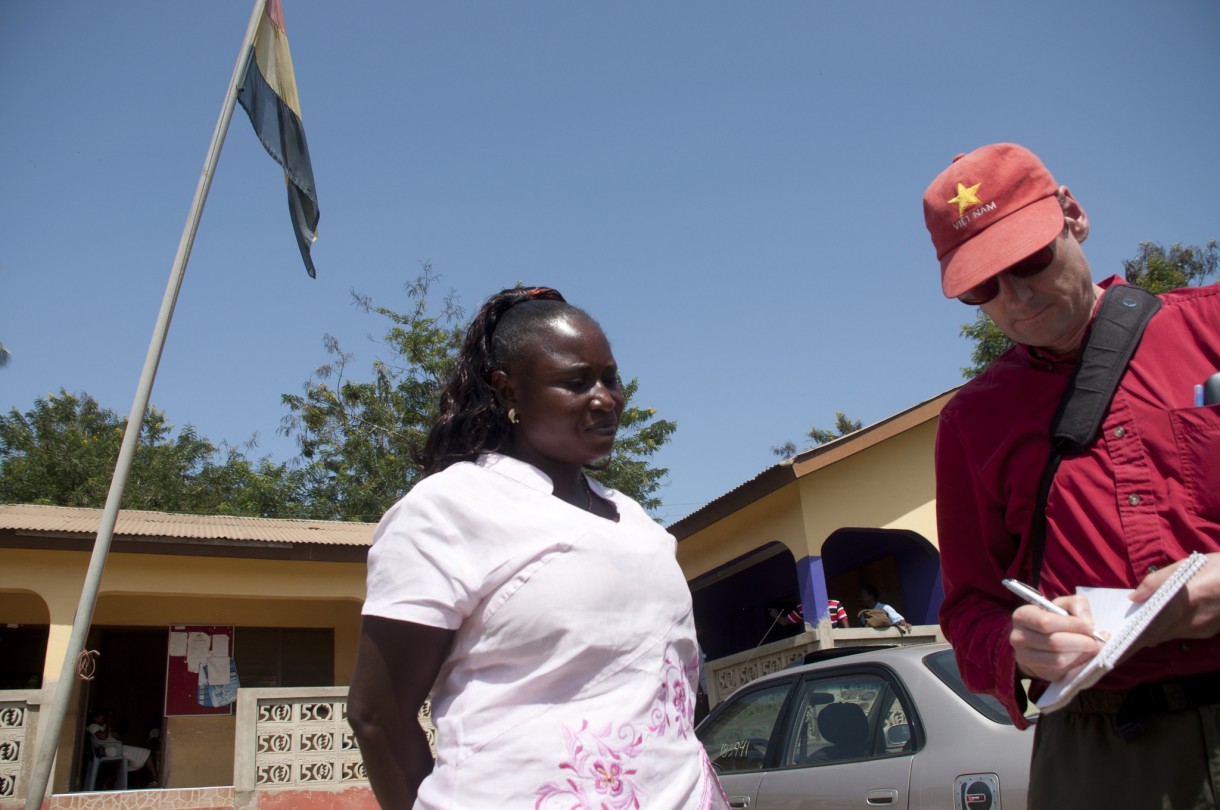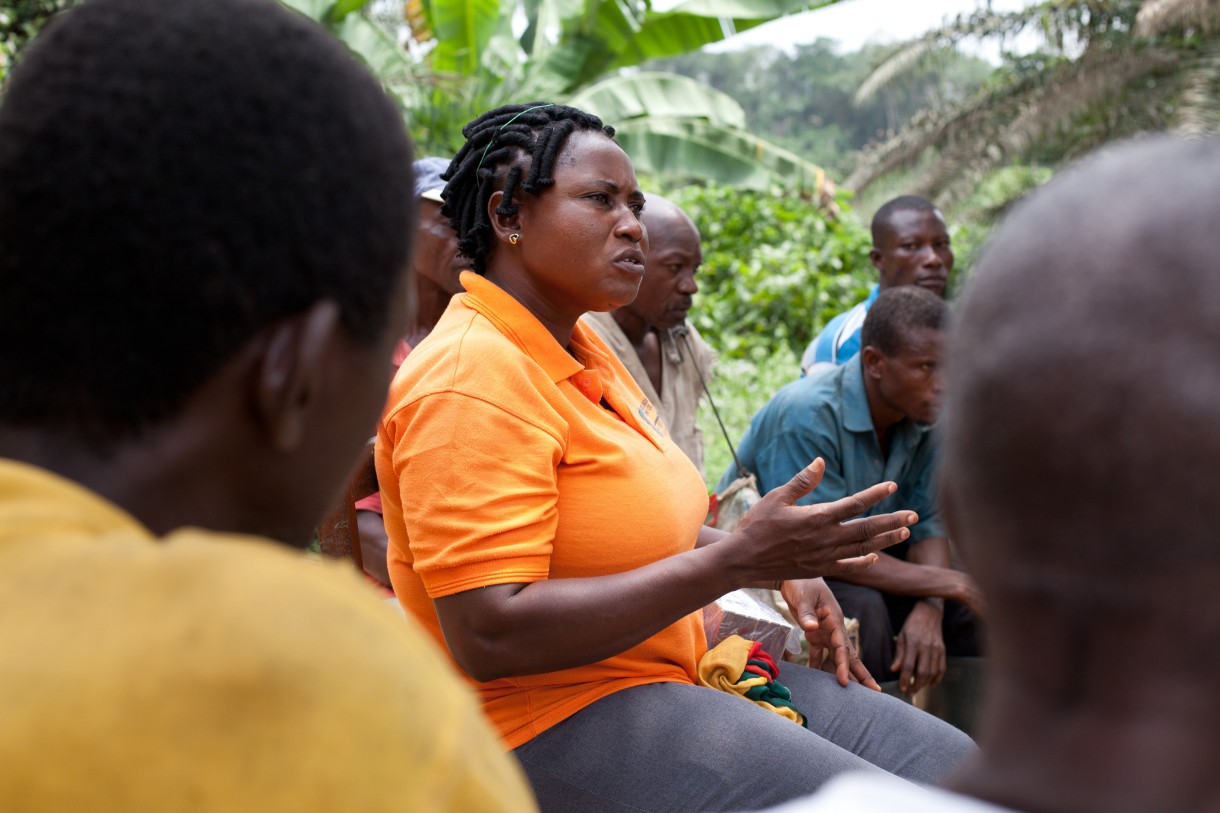Fighting giants isn’t easy
Farmer, defender of rights, and elected official Joanna Manu wants to change the relationship between politicians and people in Ghana.
David, the Biblical warrior who defeated Goliath, is an inspiring leader who overcame difficult odds and triumphed. People love stories about giant slayers: ordinary people who stand up to the powerful and triumph. We are fascinated by their determination and bravery; where do these qualities come from, how can we be like that, too?
In my work for Oxfam, I meet a lot of people who are struggling against really giant injustices. They identify things that are wrong in their community, and they work to make them right. I always try to find visionary leaders with good stories I can share with Oxfam supporters, because I want them to see how hard people are working to end poverty in their own lives. One of them is from Ghana: Joanna Manu, who appears in a new video we are launching today called “Unleash your inner David.”
The first time I met Manu, she told me she had once been arrested by police and security from a mining company called Golden Star Resources for alleged trespassing –on her own field as she was preparing to plant her crops. At that time (2007), Manu was a community activist in her early 30s who had recently completed a training program with our partner WACAM in her village, Dumasi, in Ghana’s Western Region.

Manu and her neighbors were living near an active gold mining site, and were struggling to keep their families safe as the mine encroached onto their land and into their lives. They faced pollution (cyanide spills in nearby rivers), and blasting in the mining pits just behind their village (sending rocks flying through the air into their homes).
Mining companies and local governments sometimes just sweep aside poor farmers who get in the way of a gold mine, but that’s not what happened here: Manu told me that thanks to her training with WACAM, she cited portions of Ghana’s Minerals and Mining Act when she appeared before a judge, and walked free. She is still farming on that land today.
That day I met Manu she was with a few of her neighbors and seemed a little quiet. She had a shy smile, her eyes were down, and she didn’t say much. But I asked her a few questions, and she opened up enough for me to get a sense of her intelligence and commitment. She looked me in the eye told me she wanted to become a politician, maybe even a member of Ghana’s parliament.
I asked her why she is so committed to public service and she said “I see fellow human beings as I see myself, and if they can’t defend their rights, then I have to help them. I am saving humanity.”
Damn, I thought, people need to know about this woman’s story.
Since then, when I am in Ghana, I try to see Manu or—when I cannot get out to Dumasi—I look up common friends to see how she’s doing. By 2011, when I saw her again, she had just won an election to represent her area in the District Assembly (kind of like a state legislature in the US). She had endured a tough campaign against a male opponent. She said her training with WACAM taught her some important lessons about leadership that helped her win: “How to listen, to be humble before people, to understand their issues. Courage. Confidence.”

My most recent visit with Manu was in February this year. I spent a day with her, visiting her constituents outside Bogoso, a major mining center near Dumasi. She had already helped people in this area to find the funds and materials to build a steel bridge across a nearby river, and now the villagers were working on a modest community center. Manu was helping them find the money for concrete, lumber, and sheet metal roofing.
Manu had a lot of support from this village and many others in her district, and she promised them a change from business as usual: “When you elect someone to represent you at the Assembly or Parliament, that is that. They will not come back to you again and see if you need something,” Manu told me. “They will not be there for you when your road is bad, they will not mind you. You will never see them again.”

“Because they elected me to go and represent them, I have to come back and account [to] them.”
One local chief I interviewed told me his community had previously always elected a man for their representative in the District Assembly. “She works harder than the previous men,” he said. “We’re very happy with her and we will support her.”
Manu’s story shows that when people decide to change the world, they can make a difference. So many people I talk with here in the US feel sort of overwhelmed by the wrongs they see in the world. They say they can’t fight city hall or whatever. But Americans often overlook our power to create change. We have tremendous consumer power alone, we can vote for leaders who represent our ideals, and we have the right to free speech.
I think it’s a lot of responsibility to imagine righting the wrongs that you see in this world, but remember that David had an army behind him, and just about every figure you can imagine from Joan of Arc to Nelson Mandela did not work alone. So here it is: if you want to fight injustice, join us here at Oxfam, visit oxfamamerica.org/david to get involved, get the training and tools you need.
People like Manu are all over the world, fighting for justice and working to overcome poverty. They are committed to their cause and work hard on the issues that matter to them. If they can rise up to meet the giant injustices in their lives, why can’t we?